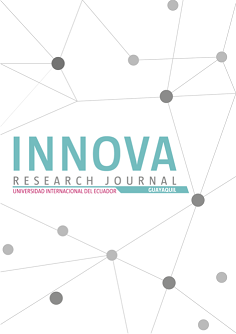The social metamorphosis of fashion: on the way to the mapping of sustainable fashion companies in Ecuador
Main Article Content
Abstract
The capitalist system and the consumer society typified the modernist society of the twentieth century and brought with it the system of fast fashion. System that generated environmental, social impacts, and that established the monoculture or the uniformation of the markets by the invasion with residual garments from the developed countries to the developing countries. Aspect that threatens the national production and clothing identity of Latin American regions. Fortunately, with the advent of postmodernism in the 19th century, and the macro tendency towards sustainability, the fashion system is rethought. The objective of this research was to geographically and conceptually map sustainable fashion companies. The qualitative and ethnographic design study was based on studies of cultural cases since it revealed 11 Ecuadorian companies that design with social responsibility. Through participatory observation, in-depth interviews and ethnographic records were obtained, as a result a geographical and conceptual mapping revealed that these transforming business models empower: the encounter with a craft culture, fair trade, promotion and quality of the product, factors that allow to deduce that the Ecuadorian region is part of the social metamorphosis of the fashion system.
Downloads
Article Details
COPYRIGHT NOTICE
Authors who publish in the INNOVA Research Journal keeps copyright and guarantee the journal the right to be the first publication of the work under the Creative Commons License, Attribution-Non-Commercial 4.0 International (CC BY-NC 4.0). They can be copied, used, disseminated, transmitted and publicly exhibited, provided that: a) the authorship and original source of their publication (magazine, publisher, URL and DOI of the work) is cited; b) are not used for commercial purposes; c) the existence and specifications of this license of use are mentioned.
References
Acebedo, C. (2011). Moda: nuevo diseño argentino. Buenos Aires: Ediciones Olmo.
Acosta, A. et. al. (2013). INTI Mapa de diseño 101 diseñadores de autor. San Martín: Instituto Nacional de Tecnología Industrial. E-Book.
Brown, S. (2013). Refashioned. Barcelona. España: Editorial Blume.
Correa, M. E. (2019). Diseño y Sustentabilidad. Un nuevo escenario posible en el campo de la moda. Cuaderno 76. Cuadernos del Centro de Estudios en Diseño y Comunicación. (76), 89-104.
Correa, M. E. (2011). La producción cultural del diseño: El caso de los diseñadores independientes de la ciudad de Buenos Aires. Trabajo y Sociedad, XV(11), 329–342. Retrieved from http://www.scielo.org.ar/scielo.php?script=sci_abstract&pid=S1514-68712011000200020.
Escobar T. & Amoroso S. (2019). El giro humanista del sistema de la moda. Cuaderno 76. Cuadernos del Centro de Estudios en Diseño y Comunicación. (76), 119 –132.
Fletcher K. & Grose L. (2012). Gestionar la sostenibilidad en la moda. Diseñar para cambiar. Materiales, procesos, distribución y consumo. Barcelona: Blume.
Lawson, B. (2006). How Designers Think: The Design Process Demystified. Oxford: Architectural Press.
Gwilt, A. (2014). Moda sostenible. GG moda (1st ed.). Barcelona. Retrieved from https://ggili.com/moda-sostenible-ebook-9788425229190.html.
Hernández, R. y otros (2014) Metodología de la Investigación. México D. F: McGrawHill Mon L. y otros (2011). El diseño posible: paradigmas, mercado e identidad del diseño de indumentaria y textil en Argentina. Junín: Universidad Nacional de noroeste de la Provincia de Buenos Aires. UNNOBA.
Niinimäki, K. (2015). Ethical foundations insustainable fashion. Textiles and Clothing Sustainability, 1(1), 3. https://doi.org/10.1186/s40689-015-0002-1.
Ramón Lugo-Morin, D., Frolich, L. M., & Magal-Royo, T. (2015). Relación ser humano-naturaleza: debatiendo el desarrollo sostenible desde la filosofía de la ciencia. European Scientific Journal, 11(35). Retrieved from https://eujournal.org/index.php/esj/article/viewFile/6778/6504.
Salcedo E. (2014). Moda ética para un futuro sostenible. Barcelona: Gustavo GiliVillalva N. y Escobar T. (2016). El eco-diseño una alternativa para el desarrollo y su influencia en la moda sustentable en el cantón Ambato en el año 2015. (Tesis de pregrado). Universidad Técnica de Ambato. Ambato –Ecuador.






